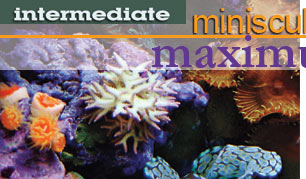 |
 |
|
Liquid marine foods are a viable and convenient supplementary diet for corals and invertebrates when used properly. They offer nutritional variety |
for a more complete diet and provide a more natural form of food for your marine aquarium inhabitants.
|
Why are liquid foods considered to be a supplementary diet? |

 A. Because there is no single food - no "magic formula" - that can provide all of the nutrients your various fishes need in one single form. Use a staple diet, a supplemental liquid diet, and vitamin and nutritional supplements as needed to ensure your fish receive all the nutrients necessary for good health.
A. Because there is no single food - no "magic formula" - that can provide all of the nutrients your various fishes need in one single form. Use a staple diet, a supplemental liquid diet, and vitamin and nutritional supplements as needed to ensure your fish receive all the nutrients necessary for good health. |
|
|
minuscule organisms offer maximum nutrition
Liquid foods are available in a variety of formulations to suit different species with different feeding habits. These diets provide inhabitants such as corals and invertebrates with a more natural form of food. Some of the more popular selections of liquid diets available include Phytoplankton, Zooplankton, and a combination of the two.
Phytoplankton are tiny plant life best suited for herbivores and filter feeders such as feather dusters, scallops, clams, and gorgonians. Typically they are from 5µm to 25µm in size. As food for zooplankton, they help establish the food chain in the reef aquarium. Phytoplankton is available in a number of products, such as
PhytoMax Expert Series Phytoplankton which comes with a dropper to avoid overdosing.
Zooplankton are minute animal life (larval stages of crustaceans and other invertebrates) and tend to be 250µm to 800µm in size. Zooplankton are ideal for carnivores such as soft and stony coral, zooanthids, mushroom corals, anemones, shrimp, and crabs.
Zooplanktos-M is a concentrated suspension of copepods (zooplankton) that does not require refrigeration.
To appeal to a larger variety of filter feeding species, consider a combination food such as
Coral Plankton which is comprised of both phytoplankton and zooplankton and comes equipped with a calibrated dosing pump for precise feedings.
feed with care
Because liquid foods are concentrated and easy to dispense, overfeeding is common. Feed sparingly and target feed with a
syringe when necessary. Uneaten food will break down and compromise water quality. Determine the dietary requirements of your particular invertebrates and follow a specific feeding regimen to maximize the benefits of liquid food and to ensure healthy water conditions.
|